Breach of Directors' Duties
VerifiedAdded on 2020/04/01
|9
|2084
|43
AI Summary
This assignment presents a case study where Ben, a director of Mineral, establishes a competing company, Bendrill, using confidential information gained during his employment. Students are tasked with analyzing whether Ben breached his duties as a director under the Corporations Act 2001 (Cth). The analysis should include relevant legal principles, application of case law like Artedomus v Del Casale, and assessment of potential criminal liabilities under ASIC's purview.
Contribute Materials
Your contribution can guide someone’s learning journey. Share your
documents today.
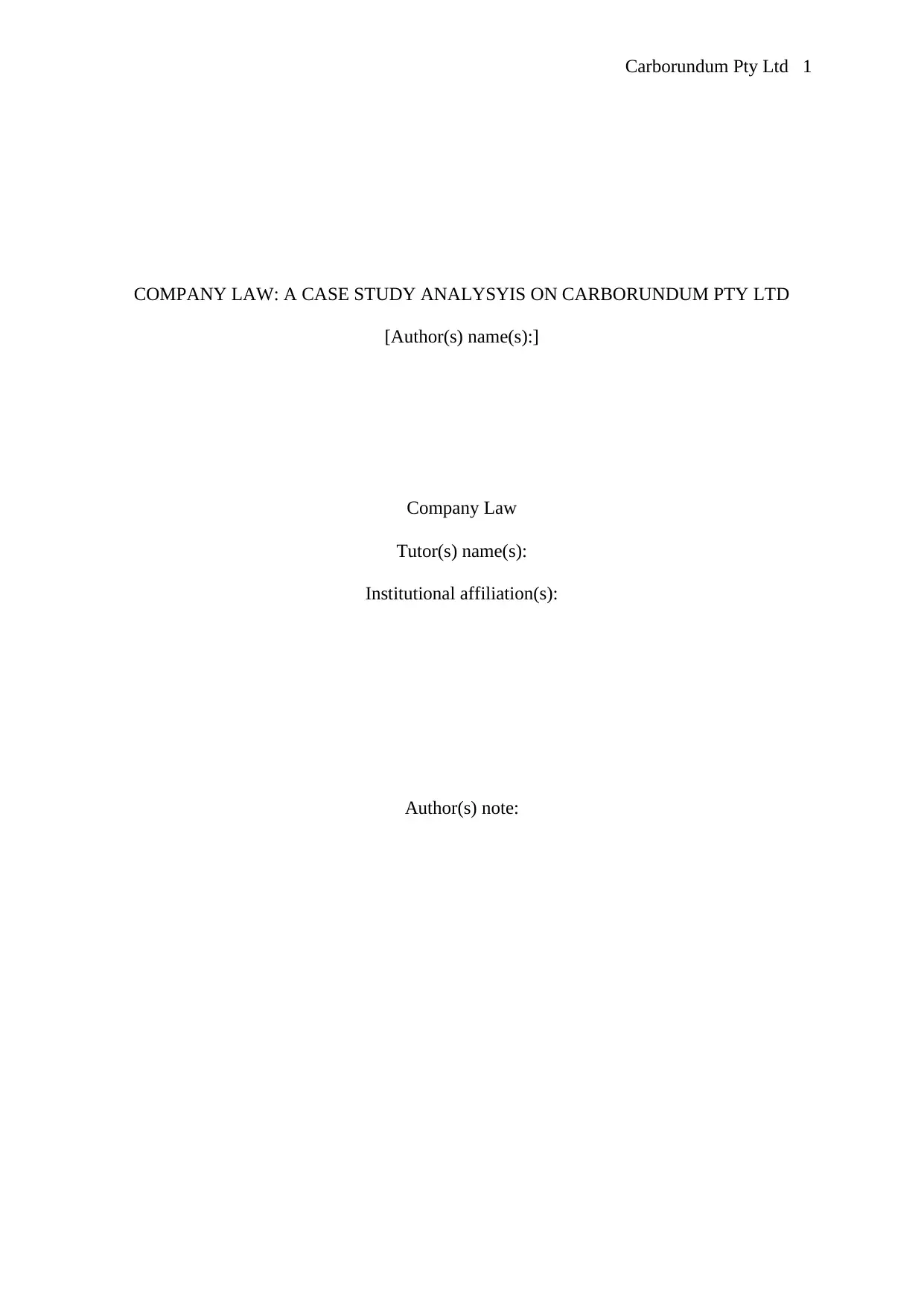
Carborundum Pty Ltd 1
COMPANY LAW: A CASE STUDY ANALYSYIS ON CARBORUNDUM PTY LTD
[Author(s) name(s):]
Company Law
Tutor(s) name(s):
Institutional affiliation(s):
Author(s) note:
COMPANY LAW: A CASE STUDY ANALYSYIS ON CARBORUNDUM PTY LTD
[Author(s) name(s):]
Company Law
Tutor(s) name(s):
Institutional affiliation(s):
Author(s) note:
Secure Best Marks with AI Grader
Need help grading? Try our AI Grader for instant feedback on your assignments.

Carborundum Pty Ltd 2
Table of Contents
PART A: ADVICE TO HILARY..............................................................................................3
PART B: ADVICE TO DONALD............................................................................................5
PART C: ADVICE TO COLIN.................................................................................................6
PART D: ADVICE TO ERIC....................................................................................................7
PART E: ADVICE TO ALAN..................................................................................................8
Table of Contents
PART A: ADVICE TO HILARY..............................................................................................3
PART B: ADVICE TO DONALD............................................................................................5
PART C: ADVICE TO COLIN.................................................................................................6
PART D: ADVICE TO ERIC....................................................................................................7
PART E: ADVICE TO ALAN..................................................................................................8
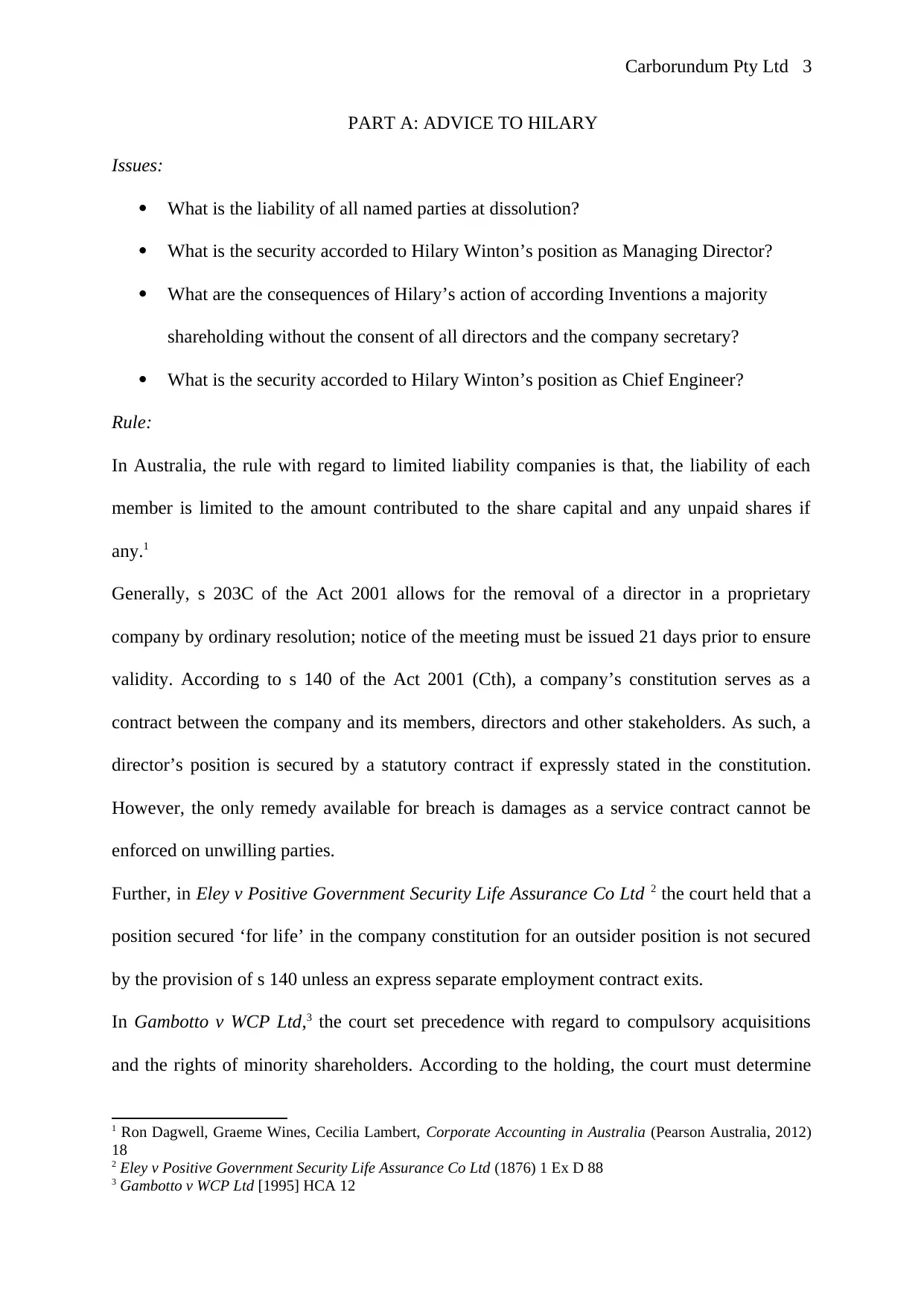
Carborundum Pty Ltd 3
PART A: ADVICE TO HILARY
Issues:
What is the liability of all named parties at dissolution?
What is the security accorded to Hilary Winton’s position as Managing Director?
What are the consequences of Hilary’s action of according Inventions a majority
shareholding without the consent of all directors and the company secretary?
What is the security accorded to Hilary Winton’s position as Chief Engineer?
Rule:
In Australia, the rule with regard to limited liability companies is that, the liability of each
member is limited to the amount contributed to the share capital and any unpaid shares if
any.1
Generally, s 203C of the Act 2001 allows for the removal of a director in a proprietary
company by ordinary resolution; notice of the meeting must be issued 21 days prior to ensure
validity. According to s 140 of the Act 2001 (Cth), a company’s constitution serves as a
contract between the company and its members, directors and other stakeholders. As such, a
director’s position is secured by a statutory contract if expressly stated in the constitution.
However, the only remedy available for breach is damages as a service contract cannot be
enforced on unwilling parties.
Further, in Eley v Positive Government Security Life Assurance Co Ltd 2 the court held that a
position secured ‘for life’ in the company constitution for an outsider position is not secured
by the provision of s 140 unless an express separate employment contract exits.
In Gambotto v WCP Ltd,3 the court set precedence with regard to compulsory acquisitions
and the rights of minority shareholders. According to the holding, the court must determine
1 Ron Dagwell, Graeme Wines, Cecilia Lambert, Corporate Accounting in Australia (Pearson Australia, 2012)
18
2 Eley v Positive Government Security Life Assurance Co Ltd (1876) 1 Ex D 88
3 Gambotto v WCP Ltd [1995] HCA 12
PART A: ADVICE TO HILARY
Issues:
What is the liability of all named parties at dissolution?
What is the security accorded to Hilary Winton’s position as Managing Director?
What are the consequences of Hilary’s action of according Inventions a majority
shareholding without the consent of all directors and the company secretary?
What is the security accorded to Hilary Winton’s position as Chief Engineer?
Rule:
In Australia, the rule with regard to limited liability companies is that, the liability of each
member is limited to the amount contributed to the share capital and any unpaid shares if
any.1
Generally, s 203C of the Act 2001 allows for the removal of a director in a proprietary
company by ordinary resolution; notice of the meeting must be issued 21 days prior to ensure
validity. According to s 140 of the Act 2001 (Cth), a company’s constitution serves as a
contract between the company and its members, directors and other stakeholders. As such, a
director’s position is secured by a statutory contract if expressly stated in the constitution.
However, the only remedy available for breach is damages as a service contract cannot be
enforced on unwilling parties.
Further, in Eley v Positive Government Security Life Assurance Co Ltd 2 the court held that a
position secured ‘for life’ in the company constitution for an outsider position is not secured
by the provision of s 140 unless an express separate employment contract exits.
In Gambotto v WCP Ltd,3 the court set precedence with regard to compulsory acquisitions
and the rights of minority shareholders. According to the holding, the court must determine
1 Ron Dagwell, Graeme Wines, Cecilia Lambert, Corporate Accounting in Australia (Pearson Australia, 2012)
18
2 Eley v Positive Government Security Life Assurance Co Ltd (1876) 1 Ex D 88
3 Gambotto v WCP Ltd [1995] HCA 12
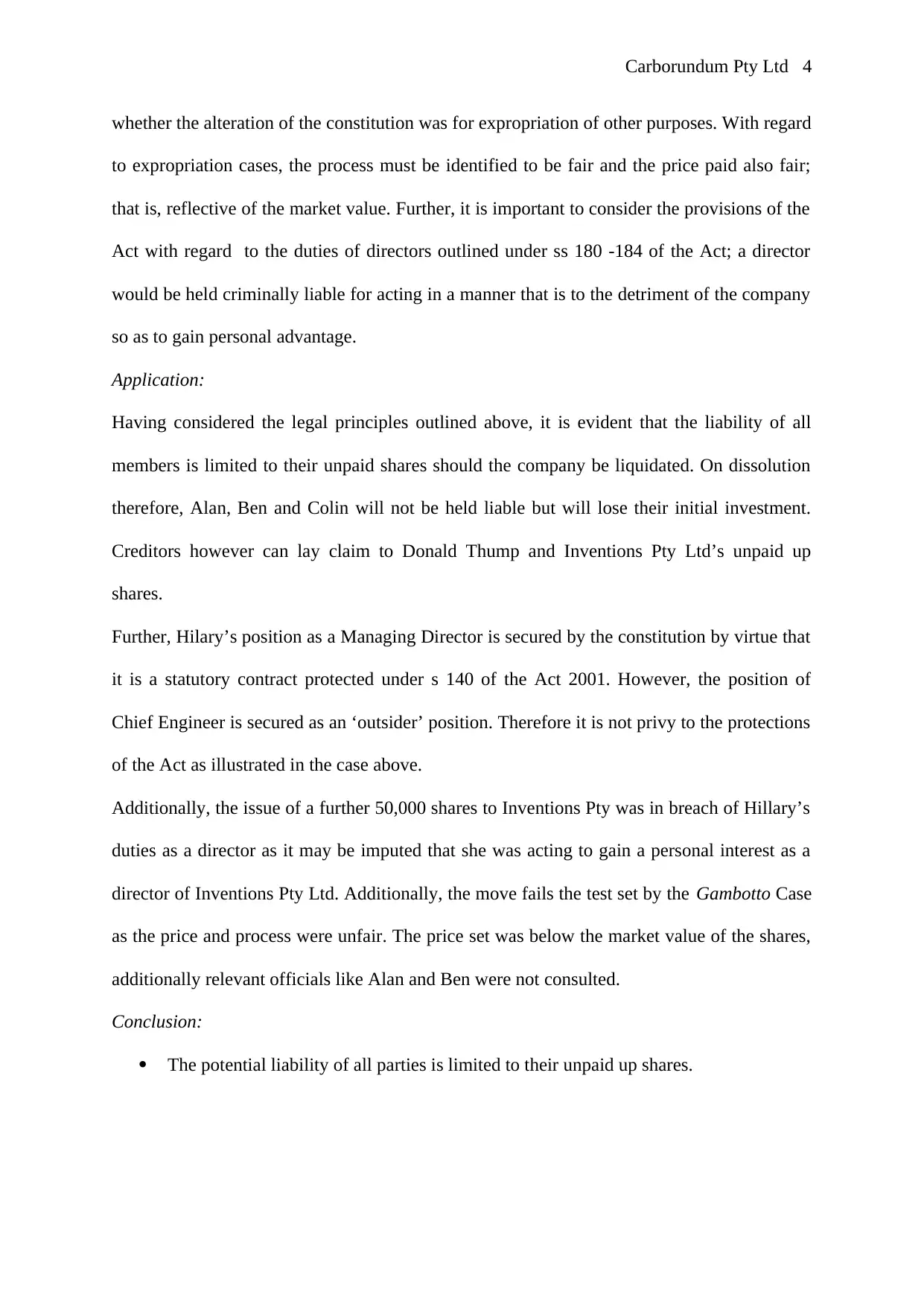
Carborundum Pty Ltd 4
whether the alteration of the constitution was for expropriation of other purposes. With regard
to expropriation cases, the process must be identified to be fair and the price paid also fair;
that is, reflective of the market value. Further, it is important to consider the provisions of the
Act with regard to the duties of directors outlined under ss 180 -184 of the Act; a director
would be held criminally liable for acting in a manner that is to the detriment of the company
so as to gain personal advantage.
Application:
Having considered the legal principles outlined above, it is evident that the liability of all
members is limited to their unpaid shares should the company be liquidated. On dissolution
therefore, Alan, Ben and Colin will not be held liable but will lose their initial investment.
Creditors however can lay claim to Donald Thump and Inventions Pty Ltd’s unpaid up
shares.
Further, Hilary’s position as a Managing Director is secured by the constitution by virtue that
it is a statutory contract protected under s 140 of the Act 2001. However, the position of
Chief Engineer is secured as an ‘outsider’ position. Therefore it is not privy to the protections
of the Act as illustrated in the case above.
Additionally, the issue of a further 50,000 shares to Inventions Pty was in breach of Hillary’s
duties as a director as it may be imputed that she was acting to gain a personal interest as a
director of Inventions Pty Ltd. Additionally, the move fails the test set by the Gambotto Case
as the price and process were unfair. The price set was below the market value of the shares,
additionally relevant officials like Alan and Ben were not consulted.
Conclusion:
The potential liability of all parties is limited to their unpaid up shares.
whether the alteration of the constitution was for expropriation of other purposes. With regard
to expropriation cases, the process must be identified to be fair and the price paid also fair;
that is, reflective of the market value. Further, it is important to consider the provisions of the
Act with regard to the duties of directors outlined under ss 180 -184 of the Act; a director
would be held criminally liable for acting in a manner that is to the detriment of the company
so as to gain personal advantage.
Application:
Having considered the legal principles outlined above, it is evident that the liability of all
members is limited to their unpaid shares should the company be liquidated. On dissolution
therefore, Alan, Ben and Colin will not be held liable but will lose their initial investment.
Creditors however can lay claim to Donald Thump and Inventions Pty Ltd’s unpaid up
shares.
Further, Hilary’s position as a Managing Director is secured by the constitution by virtue that
it is a statutory contract protected under s 140 of the Act 2001. However, the position of
Chief Engineer is secured as an ‘outsider’ position. Therefore it is not privy to the protections
of the Act as illustrated in the case above.
Additionally, the issue of a further 50,000 shares to Inventions Pty was in breach of Hillary’s
duties as a director as it may be imputed that she was acting to gain a personal interest as a
director of Inventions Pty Ltd. Additionally, the move fails the test set by the Gambotto Case
as the price and process were unfair. The price set was below the market value of the shares,
additionally relevant officials like Alan and Ben were not consulted.
Conclusion:
The potential liability of all parties is limited to their unpaid up shares.
Secure Best Marks with AI Grader
Need help grading? Try our AI Grader for instant feedback on your assignments.
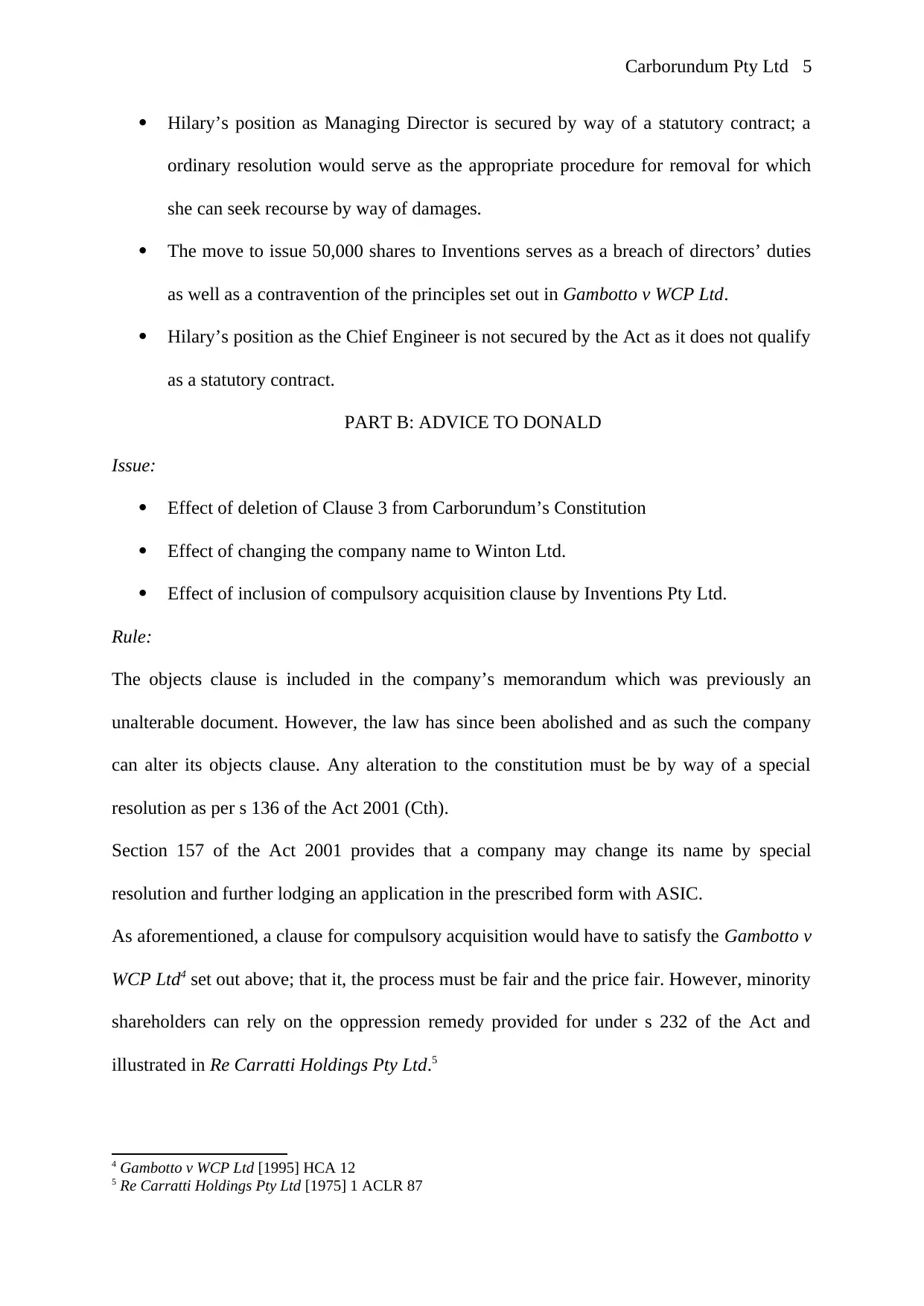
Carborundum Pty Ltd 5
Hilary’s position as Managing Director is secured by way of a statutory contract; a
ordinary resolution would serve as the appropriate procedure for removal for which
she can seek recourse by way of damages.
The move to issue 50,000 shares to Inventions serves as a breach of directors’ duties
as well as a contravention of the principles set out in Gambotto v WCP Ltd.
Hilary’s position as the Chief Engineer is not secured by the Act as it does not qualify
as a statutory contract.
PART B: ADVICE TO DONALD
Issue:
Effect of deletion of Clause 3 from Carborundum’s Constitution
Effect of changing the company name to Winton Ltd.
Effect of inclusion of compulsory acquisition clause by Inventions Pty Ltd.
Rule:
The objects clause is included in the company’s memorandum which was previously an
unalterable document. However, the law has since been abolished and as such the company
can alter its objects clause. Any alteration to the constitution must be by way of a special
resolution as per s 136 of the Act 2001 (Cth).
Section 157 of the Act 2001 provides that a company may change its name by special
resolution and further lodging an application in the prescribed form with ASIC.
As aforementioned, a clause for compulsory acquisition would have to satisfy the Gambotto v
WCP Ltd4 set out above; that it, the process must be fair and the price fair. However, minority
shareholders can rely on the oppression remedy provided for under s 232 of the Act and
illustrated in Re Carratti Holdings Pty Ltd.5
4 Gambotto v WCP Ltd [1995] HCA 12
5 Re Carratti Holdings Pty Ltd [1975] 1 ACLR 87
Hilary’s position as Managing Director is secured by way of a statutory contract; a
ordinary resolution would serve as the appropriate procedure for removal for which
she can seek recourse by way of damages.
The move to issue 50,000 shares to Inventions serves as a breach of directors’ duties
as well as a contravention of the principles set out in Gambotto v WCP Ltd.
Hilary’s position as the Chief Engineer is not secured by the Act as it does not qualify
as a statutory contract.
PART B: ADVICE TO DONALD
Issue:
Effect of deletion of Clause 3 from Carborundum’s Constitution
Effect of changing the company name to Winton Ltd.
Effect of inclusion of compulsory acquisition clause by Inventions Pty Ltd.
Rule:
The objects clause is included in the company’s memorandum which was previously an
unalterable document. However, the law has since been abolished and as such the company
can alter its objects clause. Any alteration to the constitution must be by way of a special
resolution as per s 136 of the Act 2001 (Cth).
Section 157 of the Act 2001 provides that a company may change its name by special
resolution and further lodging an application in the prescribed form with ASIC.
As aforementioned, a clause for compulsory acquisition would have to satisfy the Gambotto v
WCP Ltd4 set out above; that it, the process must be fair and the price fair. However, minority
shareholders can rely on the oppression remedy provided for under s 232 of the Act and
illustrated in Re Carratti Holdings Pty Ltd.5
4 Gambotto v WCP Ltd [1995] HCA 12
5 Re Carratti Holdings Pty Ltd [1975] 1 ACLR 87
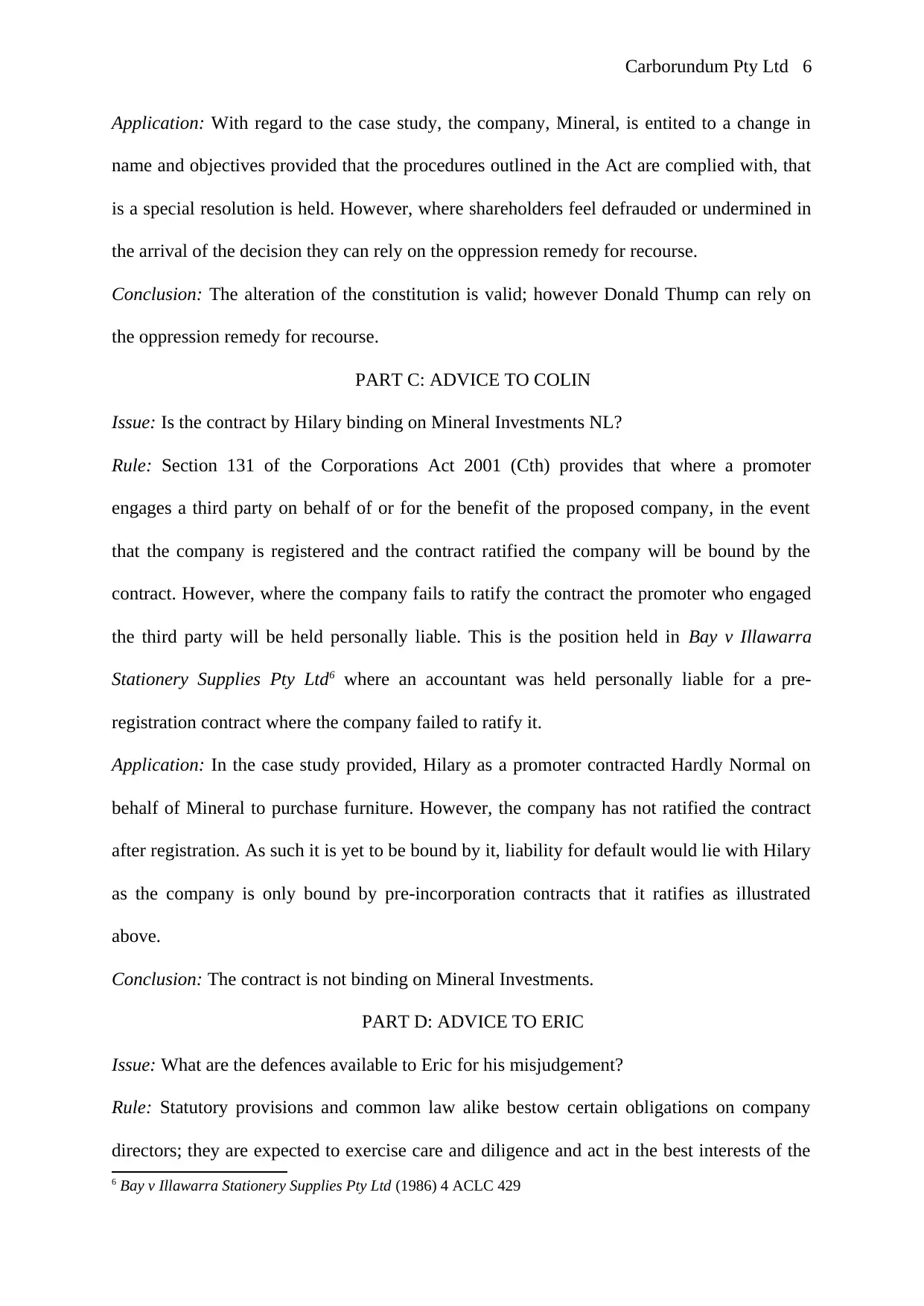
Carborundum Pty Ltd 6
Application: With regard to the case study, the company, Mineral, is entited to a change in
name and objectives provided that the procedures outlined in the Act are complied with, that
is a special resolution is held. However, where shareholders feel defrauded or undermined in
the arrival of the decision they can rely on the oppression remedy for recourse.
Conclusion: The alteration of the constitution is valid; however Donald Thump can rely on
the oppression remedy for recourse.
PART C: ADVICE TO COLIN
Issue: Is the contract by Hilary binding on Mineral Investments NL?
Rule: Section 131 of the Corporations Act 2001 (Cth) provides that where a promoter
engages a third party on behalf of or for the benefit of the proposed company, in the event
that the company is registered and the contract ratified the company will be bound by the
contract. However, where the company fails to ratify the contract the promoter who engaged
the third party will be held personally liable. This is the position held in Bay v Illawarra
Stationery Supplies Pty Ltd6 where an accountant was held personally liable for a pre-
registration contract where the company failed to ratify it.
Application: In the case study provided, Hilary as a promoter contracted Hardly Normal on
behalf of Mineral to purchase furniture. However, the company has not ratified the contract
after registration. As such it is yet to be bound by it, liability for default would lie with Hilary
as the company is only bound by pre-incorporation contracts that it ratifies as illustrated
above.
Conclusion: The contract is not binding on Mineral Investments.
PART D: ADVICE TO ERIC
Issue: What are the defences available to Eric for his misjudgement?
Rule: Statutory provisions and common law alike bestow certain obligations on company
directors; they are expected to exercise care and diligence and act in the best interests of the
6 Bay v Illawarra Stationery Supplies Pty Ltd (1986) 4 ACLC 429
Application: With regard to the case study, the company, Mineral, is entited to a change in
name and objectives provided that the procedures outlined in the Act are complied with, that
is a special resolution is held. However, where shareholders feel defrauded or undermined in
the arrival of the decision they can rely on the oppression remedy for recourse.
Conclusion: The alteration of the constitution is valid; however Donald Thump can rely on
the oppression remedy for recourse.
PART C: ADVICE TO COLIN
Issue: Is the contract by Hilary binding on Mineral Investments NL?
Rule: Section 131 of the Corporations Act 2001 (Cth) provides that where a promoter
engages a third party on behalf of or for the benefit of the proposed company, in the event
that the company is registered and the contract ratified the company will be bound by the
contract. However, where the company fails to ratify the contract the promoter who engaged
the third party will be held personally liable. This is the position held in Bay v Illawarra
Stationery Supplies Pty Ltd6 where an accountant was held personally liable for a pre-
registration contract where the company failed to ratify it.
Application: In the case study provided, Hilary as a promoter contracted Hardly Normal on
behalf of Mineral to purchase furniture. However, the company has not ratified the contract
after registration. As such it is yet to be bound by it, liability for default would lie with Hilary
as the company is only bound by pre-incorporation contracts that it ratifies as illustrated
above.
Conclusion: The contract is not binding on Mineral Investments.
PART D: ADVICE TO ERIC
Issue: What are the defences available to Eric for his misjudgement?
Rule: Statutory provisions and common law alike bestow certain obligations on company
directors; they are expected to exercise care and diligence and act in the best interests of the
6 Bay v Illawarra Stationery Supplies Pty Ltd (1986) 4 ACLC 429
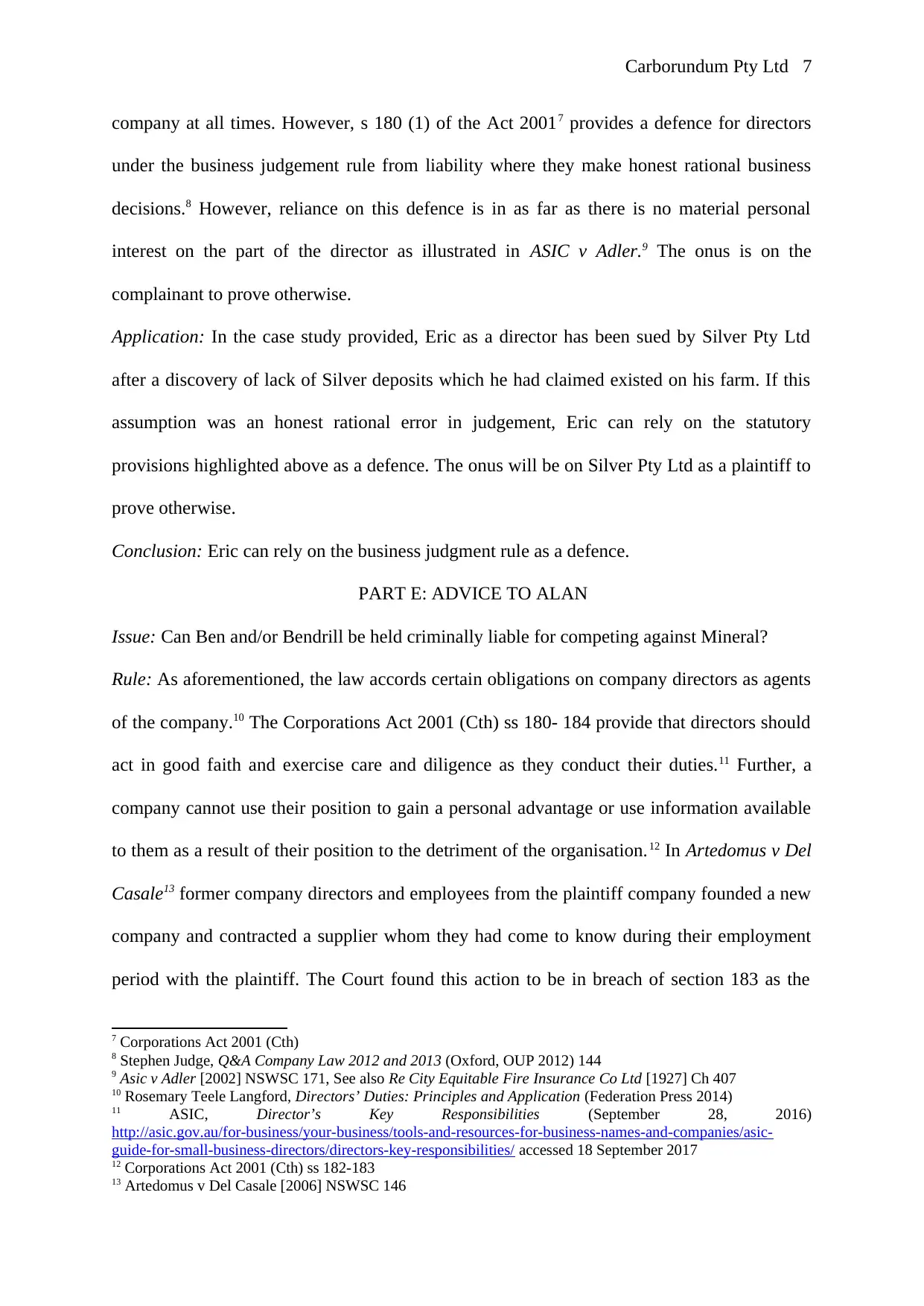
Carborundum Pty Ltd 7
company at all times. However, s 180 (1) of the Act 20017 provides a defence for directors
under the business judgement rule from liability where they make honest rational business
decisions.8 However, reliance on this defence is in as far as there is no material personal
interest on the part of the director as illustrated in ASIC v Adler.9 The onus is on the
complainant to prove otherwise.
Application: In the case study provided, Eric as a director has been sued by Silver Pty Ltd
after a discovery of lack of Silver deposits which he had claimed existed on his farm. If this
assumption was an honest rational error in judgement, Eric can rely on the statutory
provisions highlighted above as a defence. The onus will be on Silver Pty Ltd as a plaintiff to
prove otherwise.
Conclusion: Eric can rely on the business judgment rule as a defence.
PART E: ADVICE TO ALAN
Issue: Can Ben and/or Bendrill be held criminally liable for competing against Mineral?
Rule: As aforementioned, the law accords certain obligations on company directors as agents
of the company.10 The Corporations Act 2001 (Cth) ss 180- 184 provide that directors should
act in good faith and exercise care and diligence as they conduct their duties.11 Further, a
company cannot use their position to gain a personal advantage or use information available
to them as a result of their position to the detriment of the organisation.12 In Artedomus v Del
Casale13 former company directors and employees from the plaintiff company founded a new
company and contracted a supplier whom they had come to know during their employment
period with the plaintiff. The Court found this action to be in breach of section 183 as the
7 Corporations Act 2001 (Cth)
8 Stephen Judge, Q&A Company Law 2012 and 2013 (Oxford, OUP 2012) 144
9 Asic v Adler [2002] NSWSC 171, See also Re City Equitable Fire Insurance Co Ltd [1927] Ch 407
10 Rosemary Teele Langford, Directors’ Duties: Principles and Application (Federation Press 2014)
11 ASIC, Director’s Key Responsibilities (September 28, 2016)
http://asic.gov.au/for-business/your-business/tools-and-resources-for-business-names-and-companies/asic-
guide-for-small-business-directors/directors-key-responsibilities/ accessed 18 September 2017
12 Corporations Act 2001 (Cth) ss 182-183
13 Artedomus v Del Casale [2006] NSWSC 146
company at all times. However, s 180 (1) of the Act 20017 provides a defence for directors
under the business judgement rule from liability where they make honest rational business
decisions.8 However, reliance on this defence is in as far as there is no material personal
interest on the part of the director as illustrated in ASIC v Adler.9 The onus is on the
complainant to prove otherwise.
Application: In the case study provided, Eric as a director has been sued by Silver Pty Ltd
after a discovery of lack of Silver deposits which he had claimed existed on his farm. If this
assumption was an honest rational error in judgement, Eric can rely on the statutory
provisions highlighted above as a defence. The onus will be on Silver Pty Ltd as a plaintiff to
prove otherwise.
Conclusion: Eric can rely on the business judgment rule as a defence.
PART E: ADVICE TO ALAN
Issue: Can Ben and/or Bendrill be held criminally liable for competing against Mineral?
Rule: As aforementioned, the law accords certain obligations on company directors as agents
of the company.10 The Corporations Act 2001 (Cth) ss 180- 184 provide that directors should
act in good faith and exercise care and diligence as they conduct their duties.11 Further, a
company cannot use their position to gain a personal advantage or use information available
to them as a result of their position to the detriment of the organisation.12 In Artedomus v Del
Casale13 former company directors and employees from the plaintiff company founded a new
company and contracted a supplier whom they had come to know during their employment
period with the plaintiff. The Court found this action to be in breach of section 183 as the
7 Corporations Act 2001 (Cth)
8 Stephen Judge, Q&A Company Law 2012 and 2013 (Oxford, OUP 2012) 144
9 Asic v Adler [2002] NSWSC 171, See also Re City Equitable Fire Insurance Co Ltd [1927] Ch 407
10 Rosemary Teele Langford, Directors’ Duties: Principles and Application (Federation Press 2014)
11 ASIC, Director’s Key Responsibilities (September 28, 2016)
http://asic.gov.au/for-business/your-business/tools-and-resources-for-business-names-and-companies/asic-
guide-for-small-business-directors/directors-key-responsibilities/ accessed 18 September 2017
12 Corporations Act 2001 (Cth) ss 182-183
13 Artedomus v Del Casale [2006] NSWSC 146
Paraphrase This Document
Need a fresh take? Get an instant paraphrase of this document with our AI Paraphraser
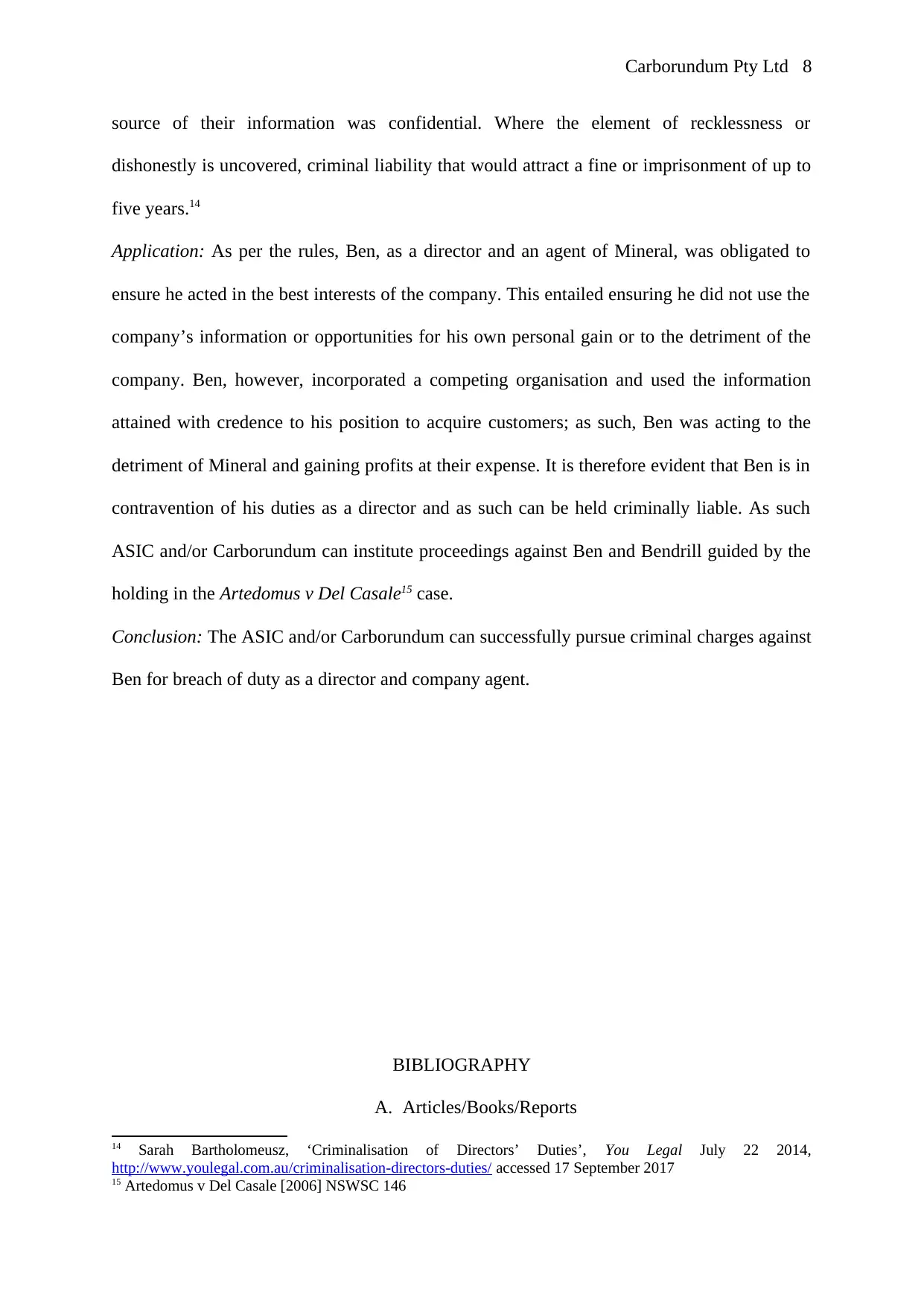
Carborundum Pty Ltd 8
source of their information was confidential. Where the element of recklessness or
dishonestly is uncovered, criminal liability that would attract a fine or imprisonment of up to
five years.14
Application: As per the rules, Ben, as a director and an agent of Mineral, was obligated to
ensure he acted in the best interests of the company. This entailed ensuring he did not use the
company’s information or opportunities for his own personal gain or to the detriment of the
company. Ben, however, incorporated a competing organisation and used the information
attained with credence to his position to acquire customers; as such, Ben was acting to the
detriment of Mineral and gaining profits at their expense. It is therefore evident that Ben is in
contravention of his duties as a director and as such can be held criminally liable. As such
ASIC and/or Carborundum can institute proceedings against Ben and Bendrill guided by the
holding in the Artedomus v Del Casale15 case.
Conclusion: The ASIC and/or Carborundum can successfully pursue criminal charges against
Ben for breach of duty as a director and company agent.
BIBLIOGRAPHY
A. Articles/Books/Reports
14 Sarah Bartholomeusz, ‘Criminalisation of Directors’ Duties’, You Legal July 22 2014,
http://www.youlegal.com.au/criminalisation-directors-duties/ accessed 17 September 2017
15 Artedomus v Del Casale [2006] NSWSC 146
source of their information was confidential. Where the element of recklessness or
dishonestly is uncovered, criminal liability that would attract a fine or imprisonment of up to
five years.14
Application: As per the rules, Ben, as a director and an agent of Mineral, was obligated to
ensure he acted in the best interests of the company. This entailed ensuring he did not use the
company’s information or opportunities for his own personal gain or to the detriment of the
company. Ben, however, incorporated a competing organisation and used the information
attained with credence to his position to acquire customers; as such, Ben was acting to the
detriment of Mineral and gaining profits at their expense. It is therefore evident that Ben is in
contravention of his duties as a director and as such can be held criminally liable. As such
ASIC and/or Carborundum can institute proceedings against Ben and Bendrill guided by the
holding in the Artedomus v Del Casale15 case.
Conclusion: The ASIC and/or Carborundum can successfully pursue criminal charges against
Ben for breach of duty as a director and company agent.
BIBLIOGRAPHY
A. Articles/Books/Reports
14 Sarah Bartholomeusz, ‘Criminalisation of Directors’ Duties’, You Legal July 22 2014,
http://www.youlegal.com.au/criminalisation-directors-duties/ accessed 17 September 2017
15 Artedomus v Del Casale [2006] NSWSC 146
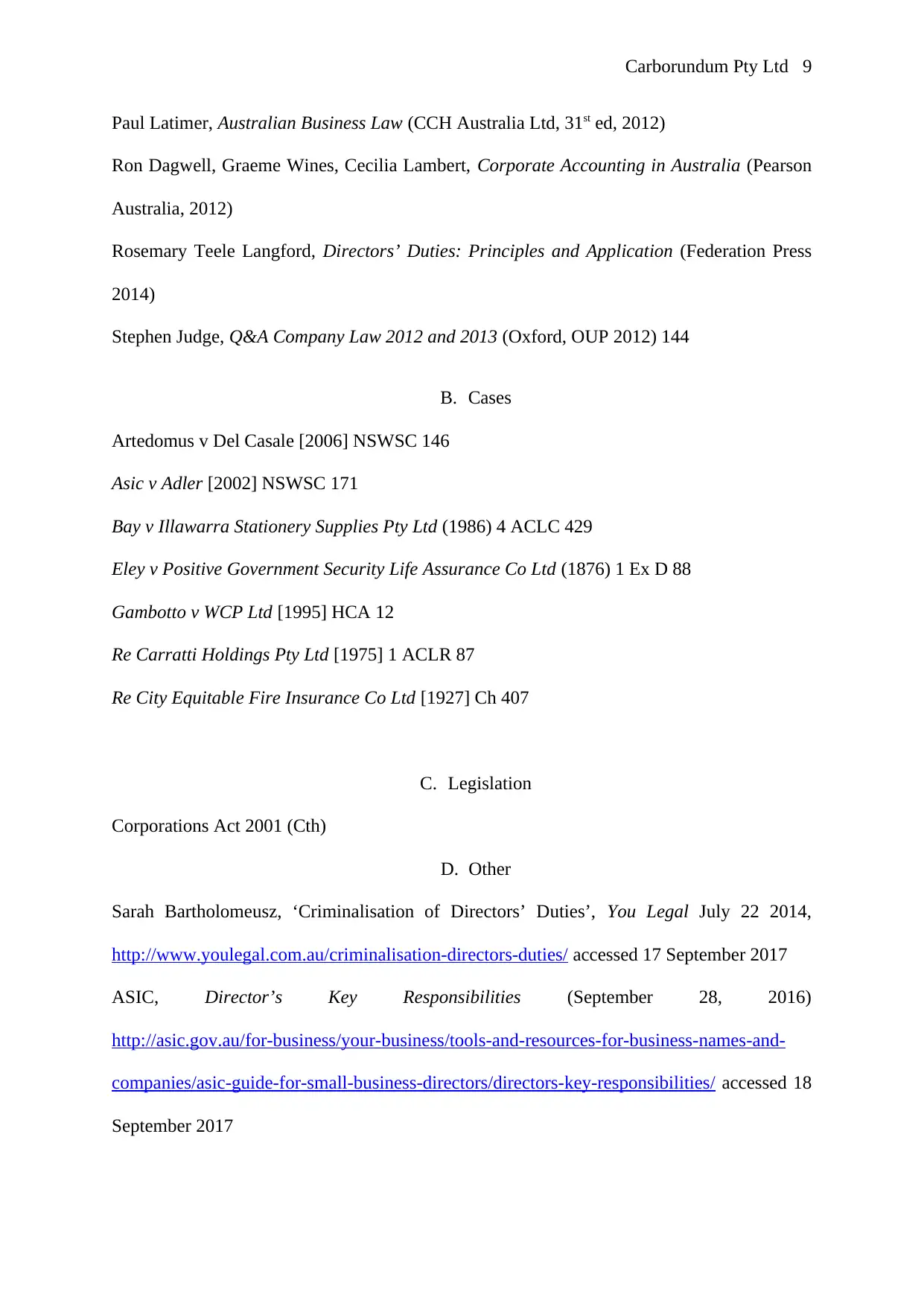
Carborundum Pty Ltd 9
Paul Latimer, Australian Business Law (CCH Australia Ltd, 31st ed, 2012)
Ron Dagwell, Graeme Wines, Cecilia Lambert, Corporate Accounting in Australia (Pearson
Australia, 2012)
Rosemary Teele Langford, Directors’ Duties: Principles and Application (Federation Press
2014)
Stephen Judge, Q&A Company Law 2012 and 2013 (Oxford, OUP 2012) 144
B. Cases
Artedomus v Del Casale [2006] NSWSC 146
Asic v Adler [2002] NSWSC 171
Bay v Illawarra Stationery Supplies Pty Ltd (1986) 4 ACLC 429
Eley v Positive Government Security Life Assurance Co Ltd (1876) 1 Ex D 88
Gambotto v WCP Ltd [1995] HCA 12
Re Carratti Holdings Pty Ltd [1975] 1 ACLR 87
Re City Equitable Fire Insurance Co Ltd [1927] Ch 407
C. Legislation
Corporations Act 2001 (Cth)
D. Other
Sarah Bartholomeusz, ‘Criminalisation of Directors’ Duties’, You Legal July 22 2014,
http://www.youlegal.com.au/criminalisation-directors-duties/ accessed 17 September 2017
ASIC, Director’s Key Responsibilities (September 28, 2016)
http://asic.gov.au/for-business/your-business/tools-and-resources-for-business-names-and-
companies/asic-guide-for-small-business-directors/directors-key-responsibilities/ accessed 18
September 2017
Paul Latimer, Australian Business Law (CCH Australia Ltd, 31st ed, 2012)
Ron Dagwell, Graeme Wines, Cecilia Lambert, Corporate Accounting in Australia (Pearson
Australia, 2012)
Rosemary Teele Langford, Directors’ Duties: Principles and Application (Federation Press
2014)
Stephen Judge, Q&A Company Law 2012 and 2013 (Oxford, OUP 2012) 144
B. Cases
Artedomus v Del Casale [2006] NSWSC 146
Asic v Adler [2002] NSWSC 171
Bay v Illawarra Stationery Supplies Pty Ltd (1986) 4 ACLC 429
Eley v Positive Government Security Life Assurance Co Ltd (1876) 1 Ex D 88
Gambotto v WCP Ltd [1995] HCA 12
Re Carratti Holdings Pty Ltd [1975] 1 ACLR 87
Re City Equitable Fire Insurance Co Ltd [1927] Ch 407
C. Legislation
Corporations Act 2001 (Cth)
D. Other
Sarah Bartholomeusz, ‘Criminalisation of Directors’ Duties’, You Legal July 22 2014,
http://www.youlegal.com.au/criminalisation-directors-duties/ accessed 17 September 2017
ASIC, Director’s Key Responsibilities (September 28, 2016)
http://asic.gov.au/for-business/your-business/tools-and-resources-for-business-names-and-
companies/asic-guide-for-small-business-directors/directors-key-responsibilities/ accessed 18
September 2017
1 out of 9
Related Documents
Your All-in-One AI-Powered Toolkit for Academic Success.
+13062052269
info@desklib.com
Available 24*7 on WhatsApp / Email
![[object Object]](/_next/static/media/star-bottom.7253800d.svg)
Unlock your academic potential
© 2024 | Zucol Services PVT LTD | All rights reserved.





